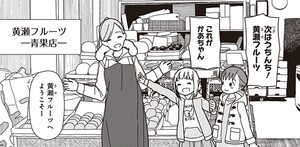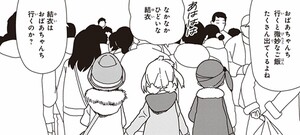One's house with 〜んち
Grammar: Colloquial and Casual Speech » 〜んち
The text 「◯◯◯ のうち」 (“◯◯◯’s house”) often gets contracted to 「◯◯◯ んうち」.
If the name ends in ん, that gets contracted in as well: 「◯◯◯ さんのうち」 becomes 「◯◯◯ さんち」.
Examples
Naru's place with 〜んち

A lunchtime conversation about recent jewelry store robberies gives way to talk about jewelry and the kinds Usagi and her friends would like to own.
- うさぎ:
- 「なるちゃんちでっかい宝石店だよね。あたしルビーすきーっ♡ パールもいいなーっ」
- “Naru's place is a huge jewelry store, isn't it? (Me, I like rubies. Pearls are also nice.)”
「なるちゃんのうち」 is contracted into 「なるちゃんち」.
Sacchan's place with 〜んち

Sacchan and her friends decide to make a movie about the district they live in. They stop by Sacchan’s mother’s shop to film a scene.
- さっちゃん:
- 「次はうちんち!黄瀬フルーツ。これがかあちゃん」
- “Next is my place! Kise Fruits. This is my mom.”
- お母さん:
- 「黄瀬フルーツへようこそー」
- “Welcome to Kise Fruits.”
「うちのうち」 is contracted into 「うちんち」.
Yui's grandmother's place with 〜んち

As the end of the year approaches, Yui and her friends discuss which New Year foods they like and dislike.
- 結衣:
- 「おばあちゃんち行くと微妙なご飯たくさん出てくるよね」
- “When I go to my grandma's house, a lot of not-so-good food is served.”
- さっちゃん:
- 「なかなかひどいな結衣」
- “That's pretty bad, Yui.”
- 琴葉:
- 「結衣はおばあちゃんち行くのか?」
- “Are you going to your grandma's house, Yui?”
「おばあちゃんのうち」 is contracted into 「おばあちゃんち」.